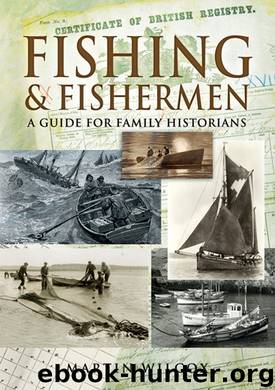Fishing & Fishermen by Martin Wilcox

Author:Martin Wilcox [Wilcox, Martin]
Language: eng
Format: epub
ISBN: 9781844685394
Publisher: Pen and Sword
Published: 2012-10-16T16:00:00+00:00
Smacksmen rowing fish to the steam cutter, mid-1880s. So dangerous was this job in winter that men are said to have refused promotion to avoid it.
The First World War seriously disrupted the industry. Already the potential of trawlers for minesweeping had been spotted, and many were hired in the run-up to war, although the numbers were insufficient and hiring soon gave way to requisitioning. The arrangements for reserving crews for them were inadequate, however, and many fishermen had enlisted in the army where their skills were largely wasted. For those who did serve in the Royal Naval Trawler Reserve there were the tasks of minesweeping and anti-submarine operations, and the necessity of getting used to naval discipline. Relationships between officers and men on a trawler–insofar as the distinction even existed–were in stark contrast to the formality of the navy, and naval officers at times despaired of fishermen who smoked, spat in the water and waved to friends on the quayside when supposed to be standing to attention. An official blind eye was usually turned to minor lapses of discipline, however, because there was no denying that the fishermen were doing an exceptionally dangerous and demanding job, and doing it well. Armed fishing vessels proved to be very effective minesweepers, towing devices which cut through mines’ anchoring lines and forced them to the surface where they could be detonated by gunfire. Needless to say this was extremely dangerous, and many trawlers were lost to the mines they were trying to destroy. Trawlers also operated as armed patrol craft. They scored several confirmed submarine kills, but perhaps more importantly their very presence forced U-boats to remain submerged for longer periods of time. This blunted the effectiveness of the U-boats and must have saved many merchant ships from destruction.
For those who remained fishing, mainly those too old or young for the forces, the normal dangers of fishing were exacerbated by enemy action. Many fishing vessels were attacked by surface raiders and submarines, and 673 were lost. The ports of western Britain experienced a resurgence as fishing effort in the North Sea was cut back, and for a while obsolete sailing trawlers again made a major contribution to landings. Some vessels that did continue to fish were fitted with concealed guns and sent out as ‘Q-ships.’ U-boats did not generally reckon it worthwhile to torpedo fishing vessels and instead ordered their crews to abandon ship and sank them with gunfire or bombs placed aboard. Therefore, if U-boats could be induced to come close enough, guns could be used to destroy them before they had a chance to submerge again. Even a few sailing trawlers were thus fitted, and succeeded in sinking several U-boats. Famously, skipper Tom Crisp of Lowestoft was awarded a posthumous Victoria Cross for an attempt to fight off a U-boat with the smack I’ll Try. Ashore, the supply of fish inevitably fell and prices rocketed, leading to some resentment against those who did continue fishing and made healthy profits as a result.
Download
This site does not store any files on its server. We only index and link to content provided by other sites. Please contact the content providers to delete copyright contents if any and email us, we'll remove relevant links or contents immediately.
| Automotive | Engineering |
| Transportation |
Whiskies Galore by Ian Buxton(40501)
Introduction to Aircraft Design (Cambridge Aerospace Series) by John P. Fielding(32346)
Small Unmanned Fixed-wing Aircraft Design by Andrew J. Keane Andras Sobester James P. Scanlan & András Sóbester & James P. Scanlan(32146)
Craft Beer for the Homebrewer by Michael Agnew(17462)
Turbulence by E. J. Noyes(7057)
The Complete Stick Figure Physics Tutorials by Allen Sarah(6646)
Kaplan MCAT General Chemistry Review by Kaplan(6065)
The Thirst by Nesbo Jo(5792)
Bad Blood by John Carreyrou(5779)
Learning SQL by Alan Beaulieu(5422)
Weapons of Math Destruction by Cathy O'Neil(5046)
Man-made Catastrophes and Risk Information Concealment by Dmitry Chernov & Didier Sornette(4748)
iGen by Jean M. Twenge(4705)
Digital Minimalism by Cal Newport;(4565)
Life 3.0: Being Human in the Age of Artificial Intelligence by Tegmark Max(4519)
Audition by Ryu Murakami(4104)
1,001 ASVAB Practice Questions For Dummies by Powers Rod(4045)
Electronic Devices & Circuits by Jacob Millman & Christos C. Halkias(4040)
Pale Blue Dot by Carl Sagan(4016)
